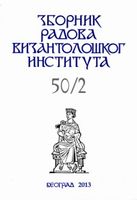KORDAX UND METHE: LASTERHAFTES TREIBEN IN BYZANTINISCHER ZEIT
Kordax And Meth: Vicious Drive In Byzantine Period
Author(s): Johannes KoderSubject(s): History
Published by: Vizantološki institut SANU
Keywords: Kordax; methe; dance; drunkenness; christian morality; satire; polemic literature
Summary/Abstract: Following antique traditions the Byzantines assessed the kordax, a dance of men, usually accompanied by songs and a kithara, and the methe, i. e. drunkenness, mostly negative. Based on an earlier publication of the same author, additional texts from the Middle Byzantine period are taken into account and evaluated in the present study. It becomes obvious that both terms and their inherent assessment are frequently combined in the written sources. In this connection the allegations of kordax and of methe were often used as a means of polemic and ridicule towards specifi c persons, whereas no direct moral criticism was attached to them. Among the writers and theologians of the Late Byzantine period a rise in the negative attitude towards kordax and methe can be discerned. Henceforward, both kordax and methe were equated with vice: not only that the ethical pressure was growing in the tight religious context of Christianity, but also generally in a society which had become morally more sensitive and also tended more often than before to use the accusation of kordax and methe in a fi gurative, symbolic sense as a means of polemic and satire.
Journal: Зборник радова Византолошког института
- Issue Year: 2013
- Issue No: 50/2
- Page Range: 947-958
- Page Count: 12
- Language: German

